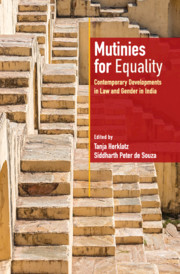11 - Conditions of Possibility: Law, Patriarchy and Single Motherhood in India
Published online by Cambridge University Press: 08 June 2021
Summary
Introduction
The 1997 Bollywood film Mrityudand (Death Sentence) has a scene between two sisters-in-law, Chandravati (Shabana Azmi) and Ketaki (Madhuri Dixit). Chandravati, whose husband is impotent, has had a brief affair with a lower caste man, Rambaran (Om Puri). Upon discovering that Chandravati is pregnant, an alarmed Ketaki asks, ‘Didi, yeh kiska bachcha hai?’ (Whose child is it?). To which Chandravati reassuringly replies, ‘Mera’ (Mine). As Nivedita Menon notes, Ketaki's question, though absurd—she can see that the ‘child’ is inside Chandravati—makes complete sense in a patriarchal society. A woman bears children of her male partner. The children inherit his name and social group membership, if she is married to him. But even if she is not, they are still his illegitimate children. Anthropologists have documented the ubiquity of the seed and earth metaphors in the procreative ideologies prevalent in the subcontinent, wherein ‘women are expected to behave like “earth”, as mere receptacles of male “seed” and give back the fruit, preferably male children’. While the mother's bodily contributions—blood and milk—are deemed significant for nourishing the child, they are not regarded as imparting identity to them, like the father’s.
Like Ketaki, until recently, the Indian state also mandatorily asked for the father's name for a range of official purposes. A gendered (di)vision of parental roles in the patriarchal family underlay these practices, which associated the father with the public sphere and the mother with the private. While this relegated all mothers to a secondary status, the normalisation of the patriarchal family model by the state has had disadvantageous consequences particularly for single mothers or ‘women bringing up their children outside the conjugal framework’.
Consider the following examples. Since hospitals refuse to record births without the father's name, sex workers are forced to get strangers off the street and have them pose as fathers of their children before the hospital authorities. While this allows them to obtain birth certificates for their children, it becomes a problem for those from Scheduled Castes when they apply for the children's caste certificates if the ‘father’ shown on the birth certificate happens to have an upper caste surname.
- Type
- Chapter
- Information
- Mutinies for EqualityContemporary Developments in Law and Gender in India, pp. 204 - 222Publisher: Cambridge University PressPrint publication year: 2021

